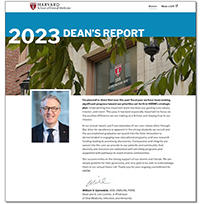
Talking, laughing, chewing, and smiling are daily facial movements everyone makes with little to no thought, however for individuals with temporomandibular disorders (TMDs), those simple movements may cause sharp pain or persistent discomfort.
A multidisciplinary team of researchers from the Harvard School of Dental Medicine (HSDM), Tufts University School of Dental Medicine (TUSDM), and Massachusetts General Hospital (MGH) has been awarded a grant from the National Institute of Dental and Craniofacial Research (NIDCR) to support their research on TMDs and train the next generation of clinicians and scientists.
Fernando Guastaldi, assistant professor of oral and maxillofacial surgery at HSDM and director of the Skeletal Biology Research Center, Division of Oral and Maxillofacial Surgery at MGH, along with his colleague, Shruti Handa, instructor in Oral and Maxillofacial Surgery at HSDM and MGH, will serve as principal investigators for the grant. The pair are leading experts in the field of temporomandibular disorders.
Affecting roughly 5-10% of the U.S. population, TMDs are a group of more than 30 conditions — including arthritis, dislocation, injury, or infection – that cause pain and dysfunction in the jaw joint and muscles that control jaw movement. For many, symptoms of TMD won’t last long, but for others the pain and discomfort can become chronic, and made worse by clenching, chewing, swallowing, or grinding teeth over time.

The funding will support the planning phase of the project Boston Collaborative for Temporomandibular Disorders (BCTMD) to better understand patient needs, and address gaps in dental school curriculums and treatment of TMDs.
“Orofacial pain is the most recently accredited dental specialty recognized by the American Dental Association, recognized only recently in 2020,” said Roxanne Bavarian, lecturer on Oral and Maxillofacial Surgery at HSDM, and a researcher with the BCTMD. “Because of this, there is a lot of variability throughout the field of dentistry in terms of what is taught and practiced in the diagnosis and management of temporomandibular joint and muscle disorders.”
Planning grants from the NIDCR are intended to enable institutions to develop partnerships, infrastructure, and capabilities needed to address the major goals of a future collaborative.
“The nationwide collaboration can help build tools to study and understand this patient population's disease progression and treatment outcomes,” said Handa. “This can help us build guidelines for treating patients with TMDs and improve outcomes.”
The team hopes to also find ways to better understand disease progression in temporomandibular disorders and treatment outcomes by building a central data bank. By obtaining this data from the patient population with TMDs, they intend to develop universal outcome measures and promote interprofessional education in the field of TMD.
“We are very excited about the NIDCR TMD IMPACT grant and the opportunity to advance the research and knowledge on the diagnosis and management of TMD,” said Bavarian.


